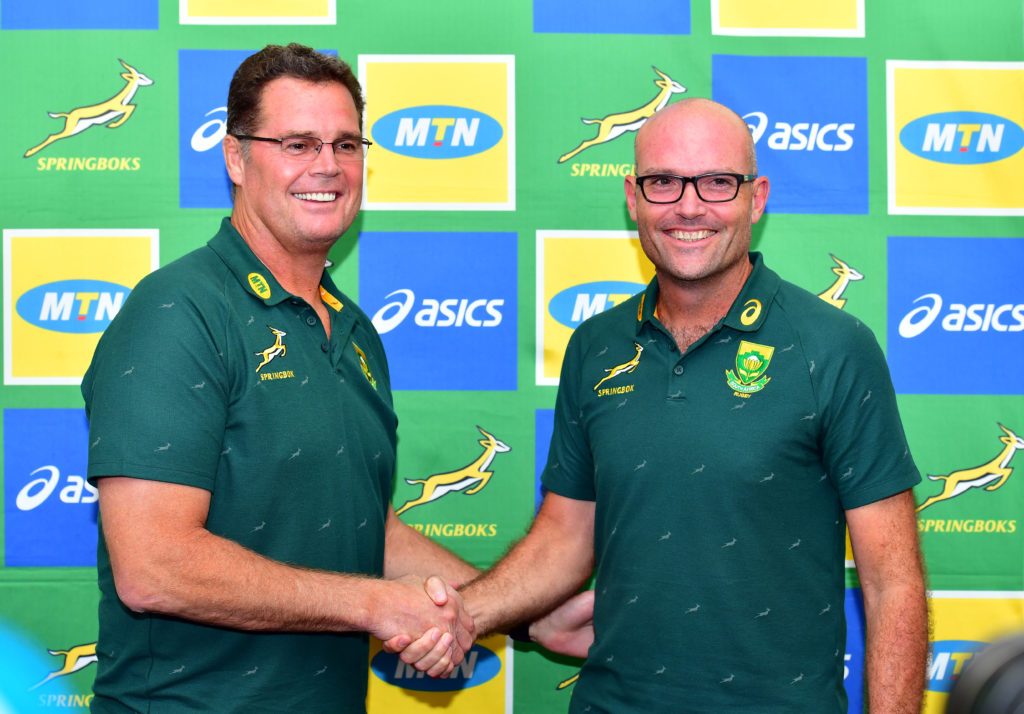The decision to prioritise development in 2018 and 2019 has laid a strong platform for the Springboks ahead of the next World Cup cycle, writes JON CARDINELLI.
Rassie Erasmus has never wavered in his belief that South African rugby has the talent to be a sustained success. Two years ago, when I interviewed the newly appointed Springbok coach for SA Rugby magazine, he was adamant that the team would turn things around and push for the 2019 World Cup title.
When one reflects on Erasmus’ quotes below, one can see that his faith in the players was well-placed. It’s amazing to note how much has changed in terms of results since Erasmus was first appointed, from the momentous away win against the All Blacks in 2018 to the Rugby Championship and World Cup successes in 2019.
BUILDING A BOK DYNASTY (Part 1): The back three
Two years ago, of course, nobody was betting on a Bok side ranked seventh in the World Rugby standings. But Erasmus, a well-travelled coach who had just returned from a stint in Ireland, recognised the raw potential and ultimately the opportunity to build something special.
‘Look, I could say, “Yes, we can beat New Zealand,” but that’s just another quote, isn’t it? It doesn’t mean anything. So let me rather talk about the potential in our personnel,’ he told me.
‘I coached with and against some unbelievable players in Europe. What I noticed, however, is that the players in South Africa don’t need to stand back for those guys. If we can get things aligned, we should bounce back in a short space of time. We’re much closer than most people may think. It’s just about maximising that potential.’
When I caught up with Erasmus a couple of hours after the 2019 World Cup final, all he wanted to talk about was the next four-year cycle and the opportunity to build a dynasty.
South Africa realised their performance and transformation objectives in 2019. They also developed a wider group of players to take them through to the series against the British & Irish Lions in 2021 and possibly all the way to the next World Cup in 2023.
While savouring a lukewarm Japanese beer at the Bok team hotel in Tokyo Bay a few hours after the 2019 final, I reflected on another statement made in that prophetic interview back in 2018. Some may have forgotten, but a lot of people were opposed to SA Rugby’s decision to hand Erasmus a six-year contract.
FEATURE: Duane Vermeulen has unfinished business against Lions
‘I understand why SA Rugby made that decision, though, because there is the Lions series in 2021 and the 2023 World Cup after that,’ Erasmus said at the time. ‘We have short-term goals. We must get a winning culture going and get the morale up, but you can’t just be in survival mode between now and the 2019 World Cup. You have to be in strategic mode too.
‘If you are the Bok coach and you have an aligned system in place, you can make all sorts of plans for the short and long term. You can think about where you are thin at Test level, say at No 9 or 10. You can plan for the Boks to get better year on year while still focusing on the immediate task of the Test season. You can get coaches coming through too, and strengthen your management team down the line.’
The decision to appoint Erasmus as director of rugby for a substantial period has proved inspired. The Boks have already won the Rugby Championship and World Cup, and yet they’re in a position to strengthen their hold on both titles as well as their chances of winning another major series in 2021.
Prior to the Covid-19 outbreak, I had the opportunity to chat to Erasmus as well as the new coach Jacques Nienaber about their plans for 2020 and beyond. It was interesting to hear that in spite of all their success they remained determined to strengthen the team’s depth in certain positions and eradicate any complacency borne by the triumphs of 2019.
ALSO READ: Lockdown waiting game continues
Erasmus and Nienaber intended to use the July Tests – two against Scotland and one against Georgia, as well as two additional games involving a SA A side – to experiment with new combinations and trial promising youngsters. With the country still on lockdown and travel bans in place for the foreseeable future, however, we’re unlikely to see any international rugby in the next few months.
How will the Bok management adjust with regards to their plans when sport gets the green light to resume? Erasmus and Nienaber may not be as experimental if the July matches are cancelled altogether and they are forced to begin the Test season with the more demanding Rugby Championship.
What won’t change is the fact that Erasmus has developed several excellent options in each position over the past two years. What’s more, the first seven rounds of the 2020 Super Rugby tournament have shown that South Africa has an abundance of talent in reserve.
Photo: Johan Rynners/Gallo Images





